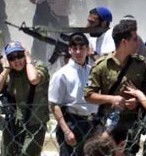25 September 2002

‘The army resumed participation in our cultural events and activities’.
Aiming his M-16 at Palestinian commuters, Yaron Dor, a resident of Kiryat Arba, an Israeli settlement in Hebron, said he was doing his part to restore normality.
“The Prime Minister said we need to fight terrorism by going on with our lives, so I’m doing what I’ve done—and done well—since I was 16: harassing Palestinians,” he said. “Before this wave of terror, we were free to assault and brutalize our Palestinian neighbours with near-total impunity. Now we can resume our daily habits.”
Israeli settlers in the West Bank used to burn Palestinian crops and destroy property regularly, causing extensive economic losses to the Palestinian community. Since the start of the current Intifada, however, they have had to forego arson. “We didn’t do as much as we used to; the army ended up doing much of our usual work,” Said David Keller, a well-armed US-born settler living in Kiryat Arba.
“Since the Israeli government called on all its citizens to resume normal life, we thought we have to comply with this demand,” Keller added. “Yesterday, we sprayed pesticides on the grape vines of several Palestinian farmers. We’re happy that we can resume our way of life here in Judea and Samaria.”
Elsewhere in the West Bank, Israeli settlers and IDF soldiers resumed their interrupted relations. “The army resumed participation in our cultural events and activities,” said Keller. “With the current period of calm, resulting from a long and enforced curfew, they now have more time for us.”